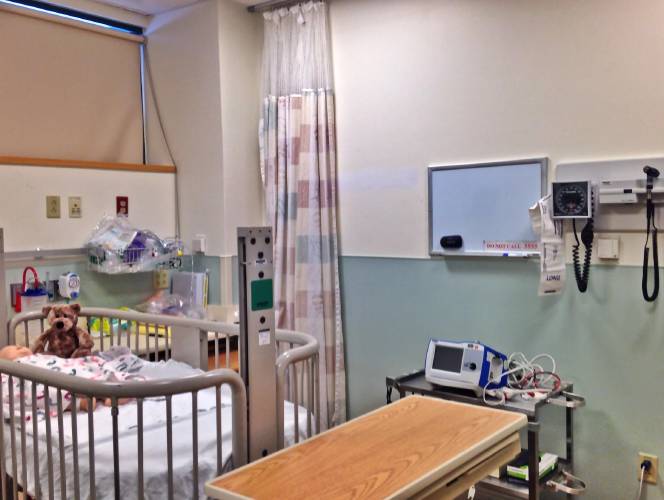Opinion: Maternity deserts in rural New Hampshire are a growing crisis. The time to act is now.

A hospital room in a maternity ward. File photo
| Published: 03-19-2025 3:48 PM |
MacKenzie Nicholson is the Senior Director at Moms Rising New Hampshire and a contributing writer for the NH Health Cost Initiative.
Access to maternity care in rural communities is shrinking at an alarming rate, leaving expectant mothers with fewer options and greater risks. This crisis affects not only moms and families but also the entire healthcare system — pregnancy and delivery complications cost Americans billions in additional healthcare expenses, workforce disruptions and social service needs.
New Hampshire has been hit especially hard, as a lack of rural health investment and hospital closures have created maternity deserts, areas where access to obstetric care is severely limited, leaving pregnant people to travel longer distances for basic prenatal care, for delivery and for postpartum services. The consequences are predictable and profound: missed appointments, increased healthcare costs and poorer maternal and infant health outcomes.
Since 2000, eleven hospitals in New Hampshire have closed their labor and delivery departments, accounting for more than 40% of the state’s hospitals. This mirrors a troubling national trend, where 55% of rural hospitals in the U.S. no longer offer labor and delivery services. The impact of these closures is being felt across New Hampshire.
We are seeing the consequences. Rural patients often face travel times of an hour or more just to reach the nearest facility for maternity care. These long distances lead to delays in prenatal care and increase the risks of complications during labor and delivery. Emergency medical transport services, already overburdened and underfunded, have become a critical but unreliable lifeline for pregnant patients in need of urgent care. Without local maternity services, rural residents are also far less likely to receive adequate postpartum care, further jeopardizing maternal and infant health.
Keeping labor and delivery units operational is costly. Providing high-quality maternity care requires 24/7 staffing of physicians and nurses, which many rural hospitals cannot sustain. Payments from private insurers and Medicaid often fall short of covering these expenses, forcing hospitals to absorb financial losses. These challenges are compounded by broader financial difficulties in rural healthcare and ongoing threats to Medicaid and the Affordable Care Act. Without adequate revenue from other services, hospitals are forced to cut labor and delivery units to stay financially viable.
Addressing this crisis requires policy reforms and investments to make rural maternity care sustainable. One solution is to build a stronger workforce by creating targeted training programs that attract and retain clinicians specializing in maternity care. Establishing independent birthing centers, increasing access to doula support, and expanding telehealth consultations with maternal-fetal specialists can help preserve and restore access.
Another critical step is investing in obstetric readiness training for emergency medical transport personnel and other healthcare providers in rural areas. This training would ensure that they can properly stabilize and transport pregnant patients in critical situations. Reforming payment models is also essential. Medicaid and private insurers must increase reimbursement rates to reflect the true cost of maintaining labor and delivery services in rural areas. Employers can also play a role by advocating for health insurance plans that sustain these services, while state policies must ensure adequate funding for a rural maternity care network.
Article continues after...
Yesterday's Most Read Articles
 ‘Field of Dreams’ to ‘a dump’ – What golfers have to say about Concord’s plans to rebuild the Beaver Meadow clubhouse
‘Field of Dreams’ to ‘a dump’ – What golfers have to say about Concord’s plans to rebuild the Beaver Meadow clubhouse
 Man dies in RV fire in parking lot of Concord’s Steeplegate Mall
Man dies in RV fire in parking lot of Concord’s Steeplegate Mall
 ‘New Hampshire is just going to embarrass itself’: Former Child Advocate warns against proposed office cuts
‘New Hampshire is just going to embarrass itself’: Former Child Advocate warns against proposed office cuts
 John Swope, longtime Concord civic leader who spearheaded Capitol Center for the Arts, dies at 86
John Swope, longtime Concord civic leader who spearheaded Capitol Center for the Arts, dies at 86
 N.H. mulls immigration bill to ban sanctuary policies and overrule local control
N.H. mulls immigration bill to ban sanctuary policies and overrule local control
 Photos: An update on some of the Concord’s springtime building projects
Photos: An update on some of the Concord’s springtime building projects
New Hampshire prides itself on being a great place to live, work and raise a family. But rising healthcare costs and limited maternity access threaten the state’s future. Without intervention, maternity care will remain out of reach for many rural families, contributing to worsening health outcomes and making it harder to attract new residents and businesses to these areas.
The loss of local maternity services is not just a healthcare issue — it is a community crisis. When hospitals cut essential services, entire communities suffer. Pregnant individuals should not have to endure long drives, inadequate access or heightened health risks just to receive the care they need. Addressing maternity deserts in rural New Hampshire requires collaboration among healthcare providers, policymakers and insurers. By supporting the rural healthcare workforce, and investing in obstetric readiness and training we can preserve access to vital maternity services and improve outcomes for mothers, babies and entire communities.
Maternity care should not be a privilege reserved for those living in urban centers. It is essential care that every family deserves. If we want to make New Hampshire the best place to live, work and raise a family, we must act now to ensure that every mom — no matter her zip code — has access to quality maternity care.
The time to act is now.







 Opinion: Concord officials: Can we sit and talk?
Opinion: Concord officials: Can we sit and talk? Opinion: Trump versus the U.S. Constitution
Opinion: Trump versus the U.S. Constitution Opinion: Protect our winters!
Opinion: Protect our winters!
